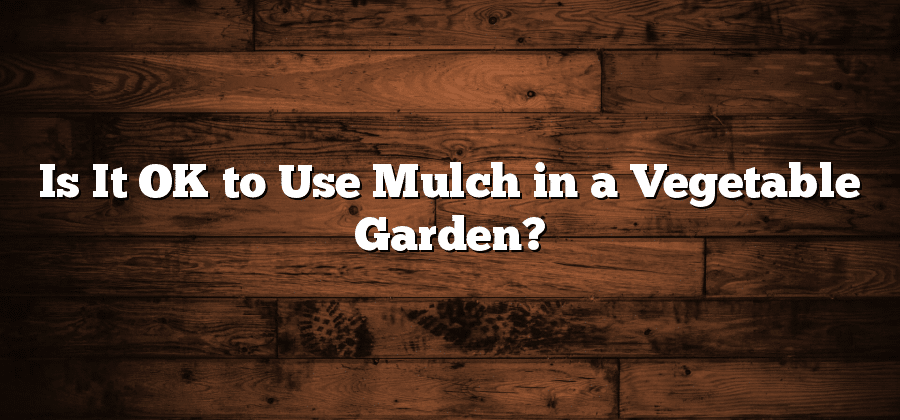Benefits of Using Mulch in Vegetable Gardens
Mulching is an essential practice for vegetable gardeners that brings various benefits to their crops. Firstly, a layer of mulch helps to conserve moisture in the soil. By reducing evaporation, mulch acts as a natural barrier, preventing water loss from the garden bed. This is particularly crucial during dry spells or in regions with limited water supply. The moisture-retention properties of mulch also promote deeper root growth in plants, ensuring they have access to the necessary water and nutrients, leading to healthier and more productive vegetables.
In addition to moisture retention, mulching offers an effective solution for weed control in vegetable gardens. When applied correctly, mulch forms a physical barrier on the soil surface that blocks sunlight and prevents weed seed germination. By suppressing weed growth, mulch reduces competition for resources such as water, nutrients, and sunlight. This, in turn, allows vegetables to thrive without being hindered by aggressive and invasive weeds. Moreover, by eliminating the need for frequent weeding, mulching saves gardeners valuable time and effort, enabling them to focus on other essential tasks for the optimal growth and care of their vegetable crops.
Types of Mulch Suitable for Vegetable Gardens
Choosing the right mulch for your vegetable garden is crucial for its overall health and productivity. There are various types of mulch available, each with its own unique properties and benefits. Here are a few options to consider.
Straw mulch is one of the most common choices for vegetable gardens. It is easily accessible, affordable, and effective at controlling weeds. Straw also provides insulation to the soil, helping to regulate temperature and prevent extreme fluctuations. Additionally, it breaks down over time, enriching the soil with organic matter.
Another popular option is compost mulch. Made from decomposed organic matter such as kitchen scraps and yard waste, compost mulch not only suppresses weeds but also adds essential nutrients to the soil. It helps improve soil structure and fertility, promoting healthier plant growth and higher yields. However, keep in mind that compost mulch may attract pests, so be vigilant in managing any issues that arise.
How to Properly Apply Mulch in a Vegetable Garden
Properly applying mulch in a vegetable garden is essential for the overall success and health of your plants. The first step in this process is to prepare the soil before laying down the mulch. This involves removing any weeds, rocks, or debris that may hinder the mulch’s ability to create a protective layer on the soil.
Once the soil is prepared, it is important to choose the right type of mulch for your vegetable garden. Organic mulches such as straw, leaves, or compost are highly recommended as they provide nutrients to the soil as they break down over time. Inorganic mulches like plastic or landscape fabric can also be used, but they do not add any nutrients to the soil.
When applying mulch, it is best to spread it evenly around the vegetable plants, ensuring that the roots are not directly covered. A layer of mulch that is around 2 to 4 inches thick is ideal for most vegetable gardens. However, take caution not to pile mulch against the stems of the plants, as this can lead to stem rot.
The Impact of Mulch on Soil Moisture Retention
Mulch is a valuable tool in maintaining adequate moisture levels in the soil of vegetable gardens. By acting as a protective layer, mulch prevents excess evaporation of water from the soil surface. This is particularly important during hot summer months or in areas with limited rainfall. The presence of mulch helps to create a microclimate that retains moisture, providing a more favorable environment for the vegetables to grow and thrive.
In addition to reducing water loss through evaporation, mulch also aids in regulating soil temperature. During scorching summer days, mulch acts as an insulating barrier, preventing the soil from becoming too hot and drying out. Conversely, in cooler seasons, mulch helps to keep the soil temperature more stable, protecting the roots of the vegetables from extreme cold. This temperature regulation further contributes to the soil’s moisture retention capacity, as the balance between water intake and loss is better maintained.
How Mulch Helps Suppress Weeds in Vegetable Gardens
Mulching is an essential practice in vegetable gardens, not only for enhancing soil health but also for minimizing weed growth. By covering the soil surface with a layer of mulch, gardeners can effectively suppress weeds and reduce the need for labor-intensive weed control methods. Mulch acts as a physical barrier that blocks sunlight from reaching weed seeds, preventing them from germinating and establishing themselves in the garden.
In addition to blocking sunlight, mulch also helps to control weeds by preventing their access to essential nutrients and water. The layer of organic or inorganic material creates a microclimate that retains soil moisture, limiting the availability of water to weeds. This lack of moisture inhibits weed growth, as most species require ample water to thrive. Furthermore, as the mulch breaks down over time, it enriches the soil with organic matter, promoting the growth of vegetables while simultaneously hindering weed development. By employing mulch as a weed suppressant, gardeners can maintain a cleaner, more manageable vegetable garden, allowing their crops to flourish.






